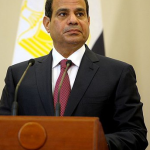When the Messiah sent out his disciples two-by-two, he instructed them to identify the man of peace in the community and engage with that person.
When you enter a house, first say, “Peace to this house.” If a man of peace is there, your peace will rest on him; if not, it will return to you (Luke 10:5-6 NIV).
The Aramaic expression “man of peace” refers to a person in a community or nation who seeks peace. This is a person of influence, often one who has a good reputation and provides an entry point for others to engage the larger community.
The world is waiting for a man of peace. This is especially true in that part of the world aflame with violence among Muslims, as well as the violence between Muslims and so many other groups: Jews, secularists, Hindus, Buddhists, Animists, and Christians.
Is there a man of peace in that world?
Maybe there is. We may have witnessed a man of peace in North Africa. A man of stature in Egypt, the heart of the Islamic civilization, has spoken words of peace.

I speak of Egyptian President Abdel Fattah al-Sisi. On New Year’s Day 2015, Sisi spoke at Al-Azhar University in Cairo, considered the leading center for Islamic studies in the world. He was addressing a group of religious scholars celebrating the birthday of the prophet Mohammed. His words were a rousing call for the reformation of Islam. To his audience of Islamic scholars and religious leaders he asked a startling question:
Is it possible that 1.6 billion people (Muslims worldwide) should want to kill the rest of the world’s population—that is, 7 billion people—so that they themselves may live? Impossible.
You imams [prayer leaders] are responsible before Allah. The entire world—I say it again, the entire world—is waiting for your next move because this umma [a word that can refer either to the Egyptian nation or the entire Muslim world] is being torn, it is being destroyed, it is being lost—and it is being lost by our own hands.
The corpus of texts and ideas that we have made sacred over the years, to the point that departing from them has become almost impossible, is antagonizing the entire world. You cannot feel it if you remain trapped within this mindset. You must step outside yourselves and reflect on it from a more enlightened perspective.
We have to think hard about what we are facing. It’s inconceivable that the thinking that we hold most sacred should cause the entire Islamic world to be a source of anxiety, danger, killing, and destruction for the rest of the world. Impossible.
President Sisi boldly called for peace to replace the strife at the heart of the Muslim world. Then on January 8th, the day the Coptic church celebrates Christmas, Sisi made a surprise visit to St. Mark’s Coptic Cathedral—the seat of the Coptic Orthodox Church. Before the church and its Pope Tawadros II he brought greetings during the Christmas Eve Mass. This act was unprecedented in modern Egyptian history.
Sisi, as a Muslim, is risking his life at the hands of Islamists, to extend the hand of peace. May his actions and clarion call mark a turning point in Islam’s relationship with the world! As Sisi celebrates the coming of the Prince of Peace with the Coptic Church, may the Peace of Christ come to that ancient land and her neighbors in North Africa and the Middle East.
- Darrow Miller
Related posts:
Leaders of Muslims Condemn ISIS Tactics
Islam: Religion of Peace or Religion of War?





